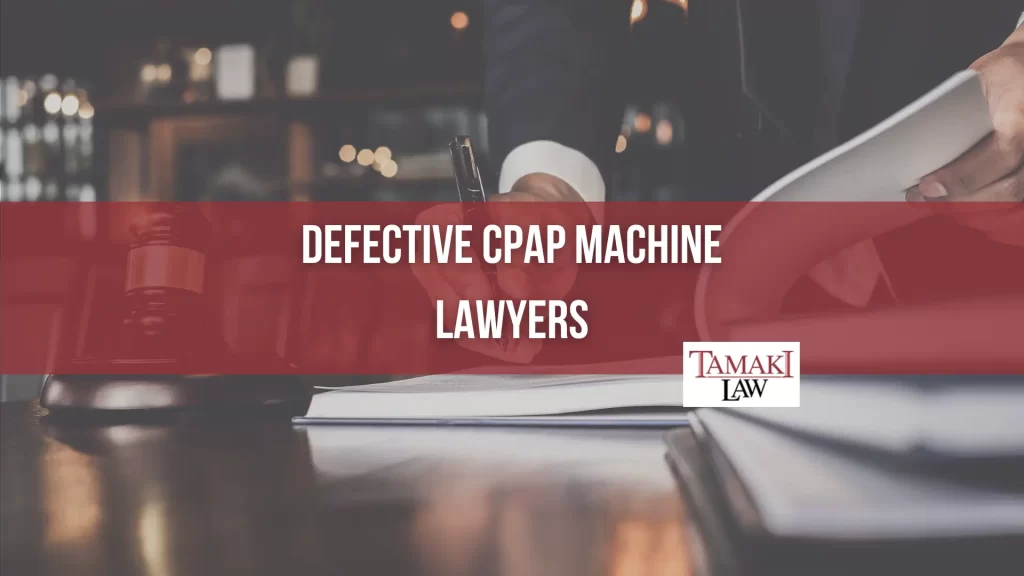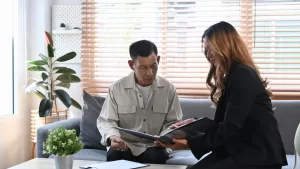
If a defective CPAP device injured you, do not hesitate to contact Tamaki Law. You might be entitled to compensation from the negligent manufacturer responsible for the harm you suffered.
Various CPAP machines used for treating symptoms of sleep apnea have been found to be defective. Adverse side effects, such as physical injuries, respiratory problems, and cancer, can result from using a faulty CPAP device.
Tamaki Law could represent you in a mass tort lawsuit against Philips Respironics if your injury or medical condition could have resulted from using a recalled CPAP machine.
The manufacturing company did not disclose the risks associated with its devices, putting consumers in harm’s way. Our legal team is ready to help you hold Philips liable and pursue the compensation you deserve.
Call Tamaki Law today at (800) 801-9564 for your free consultation to learn more about what we can do for you.
Types and Symptoms of Sleep Apnea
Sleep apnea is a serious breathing-related sleep disorder. It causes someone to stop and start breathing as they sleep repeatedly. The three main types of sleep apnea include:
- Obstructive sleep apnea – Obstructive sleep apnea is the most common. Episodes occur when the muscles at the back of the throat relax, causing the airway to close or narrow as a person breathes in.
- Central sleep apnea – The brain doesn’t transmit the necessary signals to the muscles that control breathing in a person with central sleep apnea.
- Complex sleep apnea syndrome – Someone with complex sleep apnea can suffer from obstructive sleep apnea and central sleep apnea symptoms simultaneously.
Central sleep apnea and obstructive sleep apnea symptoms are similar. It might be a challenge for a doctor to diagnose the correct type. The most common signs and symptoms of sleep apnea include:
- Loud snoring
- Waking up with a dry mouth
- Morning headaches
- Episodes of stopped breathing while asleep
- Insomnia
- Gasping for air while sleeping
- Trouble paying attention while awake
- Irritability
- Excessive daytime sleepiness
Many people turn to continuous positive airway pressure (CPAP) therapy to treat their symptoms of sleep apnea. The machine connects to a mask worn over the nose and mouth. The force of air pressure from the device can keep the airway open as a person sleeps. This alleviates snoring and reduces episodes of stopped breathing.
Risks of Using a CPAP Machine
Due to a potential health risk, Philips Respironics issued a recall of certain CPAP devices in June 2021. These machines contain a foam liner that could break down, causing the person to inhale or ingest harmful particles while they sleep.
Someone using the device could also swallow or inhale toxic chemical vapors released by the foam. These chemicals include:
- Phenol, 2,6-bis
- Dimethyl diazene
- Toluene diisocyanate
- Diethylene glycol
- Toluene diamine
Users have reported black debris in the breathing tubes and airpath circuits. They also noticed the foam liners had degraded over time.
Complications Associated with Recalled CPAP Devices
The degrading foam liners and release of toxic chemicals into a person’s airway can lead to a range of medical problems, such as:
- Heart attack
- Lung injuries
- Certain cancers, such as mesothelioma
- Stroke
- Pulmonary fibrosis
- Organ damage
Adverse side effects that could indicate complications from using a CPAP machine include:
- Dizziness
- Headaches
- Carcinogen exposure
- Sinus infections
- Upper airway irritation
- Lung inflammation
Symptoms often experienced after exposure to the toxic chemicals released by the CPAP devices are:
- Coughing
- Nausea and vomiting
- Hypersensitivity
Inhaling or ingesting the disintegrated foam liners can cause medical issues, such as:
- Respiratory illness, such as asthma
- Skin, eye, and respiratory tract irritation
- Liver and kidney problems
If you suffered an injury or notice any foam or chemical exposure symptoms, contact Tamaki Law immediately. One of our CPAP lawsuit lawyers can review your case and determine whether you qualify for a mass tort lawsuit against Philips Respironics.
Philips Products Included in the Recall
Philips Respironics recalled all CPAP, BiPAP, and ventilators manufactured between 2009 and April 26, 2021, listed below.
CPAP and BiPAP Products
Continuous ventilator, non-life supporting models:
- C-Series ASV
- C-Series S/T and AVAPS
- System One ASV4
- OmniLab Advanced+
- DreamStation ST, AVAPS
- DreamStation ASV
Continuous ventilator, minimum ventilatory support, facility use model E30
Noncontinuous ventilator models:
- SystemOne (Q-series)
- DreamStation
- DreamStation Go
- Dorma 500
- Dorma 400
- REMstar SE Auto
Ventilator Products
Continuous ventilator models:
- Aeris, Garbin Plus, LifeVent
- Trilogy 200
- Trilogy 100
Continuous ventilator, non-life supporting models:
- A-Series BiPAP A30
- A-Series BiPAP A40
Continuous ventilator, minimum ventilatory support, facility use models:
- A-Series BiPAP Hybrid A30
- A-Series BiPAP V30 Auto
The U.S. Food and Drug Administration issued a notification order to Philips Respironics on March 10, 2022. It requires the manufacturer to inform patients and other parties of the recall and the unreasonable risk of substantial harm the public could suffer due to the degradation of the foam in the devices.
You should discuss alternative treatment options for sleep apnea with your doctor if you use one of the recalled products. It’s also crucial to reach out to Tamaki Law right now if you currently use or previously used a CPAP machine and experienced adverse symptoms.
Compensation Available for Recalled CPAP Injuries
 You might be eligible to join a mass tort lawsuit against Philips if you sustained an injury or developed a medical issue from a recalled CPAP machine. Mass tort cases involve multiple plaintiffs with similar injuries pursuing legal action against the same defendant.
You might be eligible to join a mass tort lawsuit against Philips if you sustained an injury or developed a medical issue from a recalled CPAP machine. Mass tort cases involve multiple plaintiffs with similar injuries pursuing legal action against the same defendant.
The compensation you receive could cover your losses, such as:
- Pain and suffering
- Lost wages
- Lost earning capacity
- Medical expenses
- Inconvenience
- Disability or disfigurement
- Mental anguish
Contact Us
Tamaki Law believes in advocating for people suffering the harmful effects of someone else’s misconduct. We have successfully represented clients like you since 1994. You deserve to have a dedicated legal team in your corner to fight for your rights.
Philips Respironics failed to include the risks of its CPAP products on warning labels. When you hire us, we will create a strategy to hold the manufacturer accountable and aggressively pursue the compensation you’re owed.
If you sustained an injury from a recalled CPAP machine, call Tamaki Law at (800) 801-9564 today for your free consultation. You can meet with one of our CPAP machine mass tort attorneys to discuss the circumstances of your case and learn about the available legal options.
